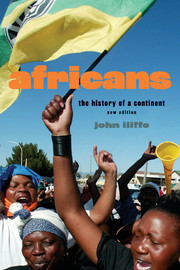Book contents
- Frontmatter
- Contents
- List of maps
- Preface to the second edition
- Africans
- 1 The frontiersmen of mankind
- 2 The emergence of food-producing communities
- 3 The impact of metals
- 4 Christianity and Islam
- 5 Colonising society in western Africa
- 6 Colonising society in eastern and southern Africa
- 7 The Atlantic slave trade
- 8 Regional diversity in the nineteenth century
- 9 Colonial invasion
- 10 Colonial change, 1918–1950
- 11 Independent Africa, 1950–1980
- 12 Industrialisation and race in South Africa, 1886–1994
- 13 In the time of AIDS
- Notes
- Further reading
- Index
- Books in the series
5 - Colonising society in western Africa
- Frontmatter
- Contents
- List of maps
- Preface to the second edition
- Africans
- 1 The frontiersmen of mankind
- 2 The emergence of food-producing communities
- 3 The impact of metals
- 4 Christianity and Islam
- 5 Colonising society in western Africa
- 6 Colonising society in eastern and southern Africa
- 7 The Atlantic slave trade
- 8 Regional diversity in the nineteenth century
- 9 Colonial invasion
- 10 Colonial change, 1918–1950
- 11 Independent Africa, 1950–1980
- 12 Industrialisation and race in South Africa, 1886–1994
- 13 In the time of AIDS
- Notes
- Further reading
- Index
- Books in the series
Summary
equipped with agriculture and iron, the peoples of western Africa sought to build up their numbers, humanise the land, fertilise it with their dead, consolidate their societies, and send out more colonists to extend the struggle with nature. These were tasks so compelling that they gave social organisation and culture a character that still underlies African behaviour today. This chapter describes the evolution of colonising societies in the savanna and forest of West and West-Central Africa between the eleventh and mid-seventeenth centuries, before the Atlantic slave trade made its most widespread impact. But some evidence is also taken from later centuries when it illuminates long-standing social patterns.
COLONISATION AND AGRICULTURE
From Senegal to Angola, most western Africans of the forest and the immediately adjoining savanna spoke Niger-Congo languages. North of them, also in the savanna, were survivors of groups probably driven southwards by the desiccation of the Sahara, speaking either Nilo-Saharan languages (possibly including the Songhay people of the middle Niger) or Afroasiatic tongues (the Hausa of modern northern Nigeria). Desert peoples – Berbers, Moors, Tuareg – also spoke Afroasiatic languages. Further desiccation in the north and laborious forest clearance in the south bred a continuing southward population drift.
This drift was not the only pattern of colonisation. The West African savanna had no single moving frontier like North America or Siberia.
- Type
- Chapter
- Information
- AfricansThe History of a Continent, pp. 63 - 99Publisher: Cambridge University PressPrint publication year: 2007



